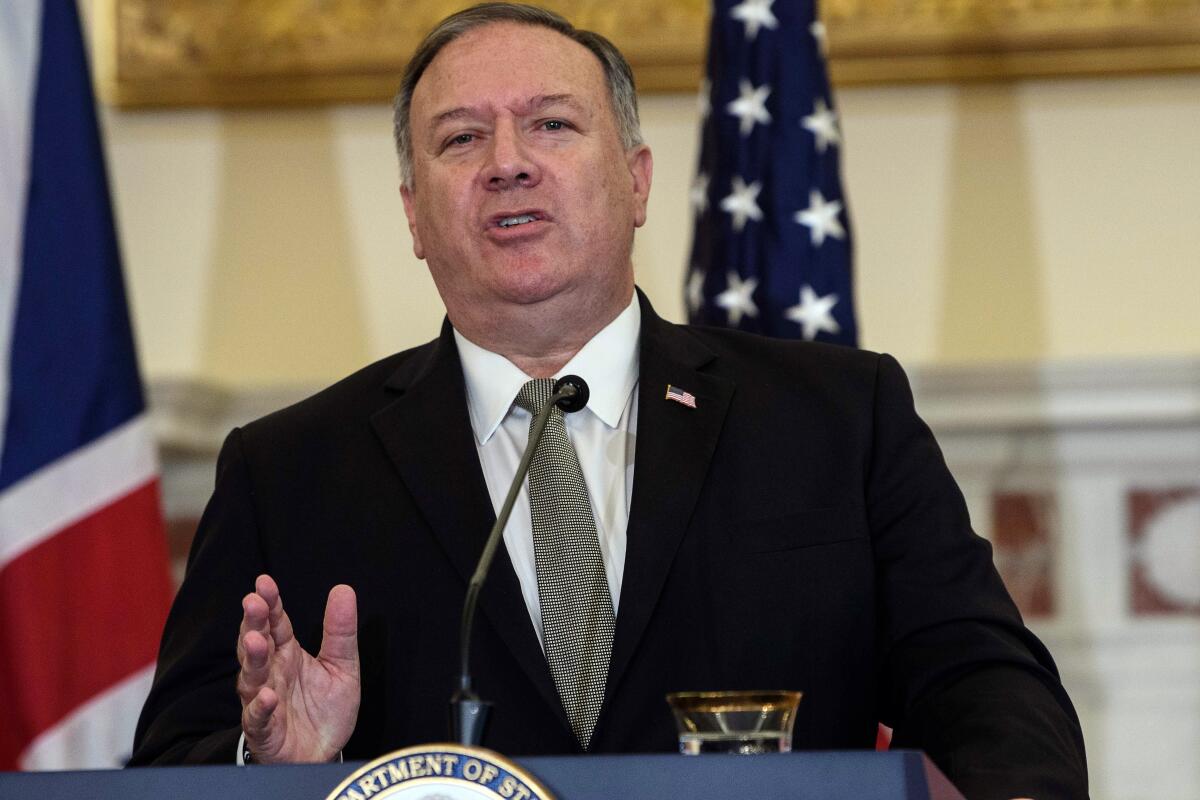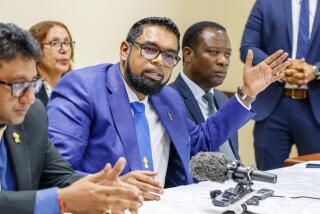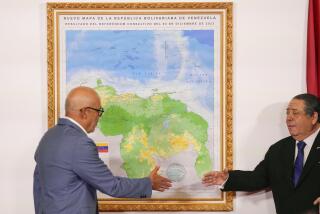Pompeo visits Guyana hoping to shore up support on Venezuela

GEORGETOWN, Guyana — U.S. Secretary of State Michael R. Pompeo visited the small nation of Guyana on Friday looking to shore up support for the Trump administration’s efforts to oust Venezuelan President Nicolás Maduro and build ties with the booming oil producer.
During the brief visit, Pompeo and President Irfaan Ali signed agreements to strengthen U.S. investment and cooperation on energy and infrastructure while vowing to deepen cooperation on maritime security and drug trafficking interdiction.
Pompeo praised Ali’s support for the Lima Group, a regional body of U.S.-aligned nations that have pushed for a diplomatic solution to Venezuela’s political crisis.
Guyana’s new president made some of his strongest remarks yet in regard to Venezuela.
“We support the need for free and fair elections in our hemisphere,” Ali said. “With urgency, we believe that democratic values and principles should be respected in Venezuela as well.”
The visit is the first by such a high-ranking U.S. official and highlights Guyana’s increasing strategic importance. The country shares a border with Venezuela and is a now major oil producer, making it an attractive ally for expanding U.S. political and economic influence in the region.
Pompeo’s trip comes on the heels of five months of political turmoil in Guyana following a contested presidential vote in March. Ali was sworn into office in August after a protracted legal battle, a Supreme Court-ordered recount and international pressure on incumbent David Granger to step down.
“The United States is ready to be your partner,” Pompeo said.
During a quick visit to the Brazilian city of Boa Vista later in the day, Pompeo said the U.S. was providing an additional $348 million to help Venezuelan refugees, including $30 million for those in Brazil, bringing the total contribution to more than $1.2 billion.
“They want what all human beings want — dignity. They want a democratic, peaceful, sovereign Venezuela to call home, one where they and their children can find jobs and live with that dignity,” Pompeo said, standing beside Brazilian Foreign Minister Ernesto Araújo.
The stops in Guyana and Brazil are part of a three-day visit to four nations — all of which surround Venezuela, where the bid by U.S.-backed opposition leader Juan Guaidó to topple Maduro stands on increasingly shaky ground. The Trump administration’s support of Guaidó has been the cornerstone of U.S. policy in the region. And it is likely to be a focal point for thousands of Latino voters in Florida, where Trump is in a close contest with Democratic presidential nominee Joe Biden.
“It’s pretty conspicuous that Pompeo is visiting every neighboring country around Venezuela,” said Geoff Ramsey of the Washington Office on Latin America think tank. “The reality is we’re in an election campaign domestically, and this is a White House that sees Venezuela policy as inextricably linked to its electoral campaign in Florida.”
Caribbean nations near Venezuela have been divided over the standoff, with many keeping ties to Maduro’s government despite a mass exodus of Venezuelans to neighboring islands that has stressed traditionally close relations.
Suriname President Chan Santokhi, in a meeting with Pompeo on Thursday, reiterated that dialogue remains his preferred approach toward finding a resolution.
“We will contribute to the dialogue and the work with all like-minded partners to ensure that the democratic rights of all the Venezuelan people are enjoyed,” he said.
The issue also is a touchy topic in Guyana, where Granger as president had publicly complained about U.S. pressure to allow the Voice of America to set up a radio station on its territory and beam propaganda messages into Venezuela. Ahead of the visit, the Human Rights Assn. of Guyana expressed concern that the nation of 740,000 people could get caught in the middle of the dispute between Venezuela and the U.S.
More to Read
Sign up for Essential California
The most important California stories and recommendations in your inbox every morning.
You may occasionally receive promotional content from the Los Angeles Times.










